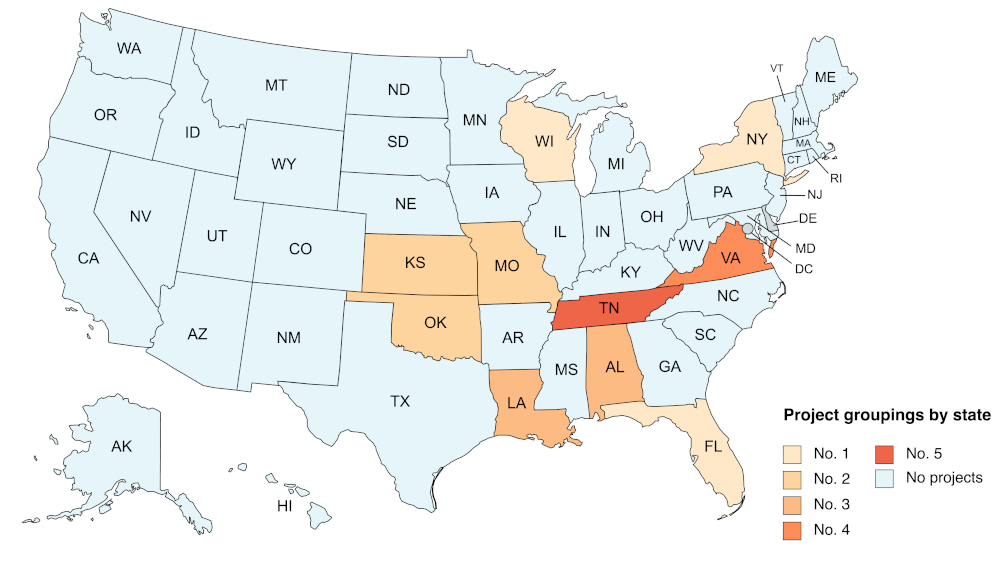The Trump administration appears to have suspended funds under the Partnerships for Climate-Smart Commodities program, putting $35 million earmarked for critical hemp projects at risk. The freeze threatens the future of projects aiming to expand hemp’s role in carbon sequestration and sustainable farming practices.
The U.S. Department of Agriculture (USDA) apparently halted all reimbursements for farmers and projects participating in the Climate-Smart initiative, a pillar of the Biden administration’s climate strategy. The suspension has left project leaders confused, as the USDA has not provided clarity on whether funding might continue after some type of review period, or even if payments will resume at all.
The withholding of the funds from the total $3 billion Climate-Smart program was first reported by the farming news service Agri-Pulse, which said it had seen a letter of concern about the pause from the Iowa Soybean Association.
See a breakdown of U.S. hemp projects under Climate-Smart Commodities
Agri-Pulse reported that the Iowa Soybean Association informed the state’s congressional delegation in a letter that the USDA has paused all reimbursements for farmers and program participants. The Association referenced a note from a USDA official in early February which stated that reimbursements were on hold pending further guidance from the department.
The Soybean Association said farmers who participated in the Climate-Smart program it manages are owed $11 million for work completed in 2024.
Hemp projects affected
Under Climate-Smart, the USDA had allocated over $35 million to five hemp-specific projects that qualified under the program’s criteria.
Hemp’s ability to offer an environmentally friendly, low-carbon alternative for products like animal feed, technical fibers, and fuel made it a key focus of the climate-smart commodities program, which is designed to help farmers adopt practices that boost revenue while benefiting the environment, and hemp was seen as an ideal crop for this purpose.
With $3.1 billion allocated to the overall Climate-Smart program, hemp’s share represents a small but important portion of the USDA’s investment in agricultural sustainability. The initiative’s goal is to develop methods to track and verify greenhouse gas reductions, with an expected sequestration of over 60 million metric tons of CO2. However, without proper funding, hemp consortia organized to take advantage of the program may not be able to carry out their projects.
Politics, of course
Tom Vilsack, the Agriculture Secretary under the Biden administration, launched the Partnerships for Climate-Smart Commodities program using $3 billion from the Commodity Credit Corporation, which is USDA’s line of credit from the Treasury. But the initiative has faced opposition from Republicans, who criticize the use of the CCC to fund the program.
Some of the $3 billion reportedly has already been distributed to the lead organizations managing the program. The remaining funds are held in an account at the Natural Resources Conservation Service and were originally planned for disbursement to participating groups on a quarterly basis.
The Climate-Smart program, part of the 2022 Inflation Reduction Act (IRA), was designed to span several years, with evaluations to assess whether the practices adopted by farmers and ranchers successfully reduce carbon emissions and generate more profitable products compared to traditional farming methods.
Reuters reports that the USDA has frozen funding for various farmer assistance programs and environmental conservation contracts amid a department-wide review. That is despite assurances from the Trump administration that programs helping farmers would not be affected in the government overhaul.
The farm vote
In a January letter from the Office of Management and Budget to federal agencies announcing pauses on some program funding, the OMB wrote: “Funds for small businesses, farmers, Pell grants, Head Start, rental assistance, and other similar programs will not be paused.”
Some of the money that has been frozen is tied to environmental conservation programs that were funded by the IRA, former President Joe Biden’s signature climate law, which included about $19.5 billion for farm programs over 10 years.
Noting that the funding freeze adds more economic uncertainty for farmers already struggling, Reuters writes: “It also comes as a surprise to a community that voted overwhelmingly for Trump in the past three presidential elections. His first term brought farmers record cash: about $217 billion in farm payments, including crop support, disaster and aid programs.”

